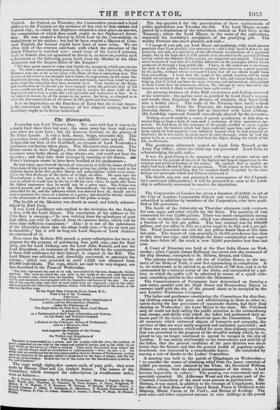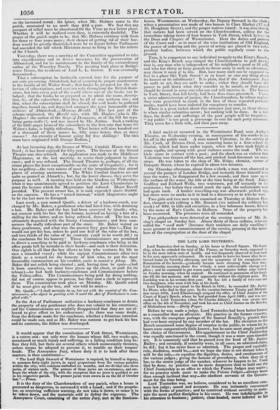The Corporation of London has given a donation of 2,000/.
in aid of the City of London Corporation School, and nearly 1,000/. has been subscribed in addition by members of the Corporation, who have quali- fied as life governors.
The Lords of the Admiralty on Thursday afternoon took contracts for rum, sugar, and other articles for the Navy. The quantity of rum contracted for was 75,000 gallons. There was much competition among the trade to obtain the contract; which was ultimately taken at within a fraction of Is. 914. per gallon. 'rhe last contract was for 100000 gallons, and was taken in July at a price equal to Is. flid. and I- per gal.. Ion. Proof Leewards are now Gd. per gallon dearer than at this time last year. The import of rum generally is 19,105 puncheons less than- at this time last year; and although the home consumption and export trade have fallen off, the stock is now 12,000 puncheons less than last year.
A Court of Directors was held at the East India House on Wed- nesday; when Captain James Kellaway was sworn into the command of the ship Bombay, consigned to St. Helena, Bengal, and China.
The column erecting on the old site of Carlton House, to the me- mory of the Duke of York, is now fast approaching to completion. It is, we understand, to be carried to an elevation of 120 feet, and is to be surmounted by a colossal statue of the Duke, and surrounded by a gal- lery, to which the public will be admitted by means of a spiral stair- case, something similar to that within the Monument.
The Commissioners of Pavements have determined on forming a new street, parallel with the High Street and Bermondsey Street, to connect itself with the site of the ground about to be occupied by the new Leather Warehouse Company.
The ladies and gentlemen constituting the Committees for distribut- ing clothing amongst the poor, and administering to them in other re- spects during the late prevalence of spasmodic cholera, had their final meeting on Wednesday ; the Lord Mayor in the chair. Mr. Pritchard said, be could not help calling the public attention to the extraordinary. zeal, energy, and ability with which the ladies had performed their ar- duous part of the duties which devolved upon the Committees. Upon all occasions which embraced objects of humanity and sympathy, the services of that sex were easily acquired and uniformly successful ; and if there was any occasion which called for more than ordinary exertions, that was presented in the progress of the dreadful malady which, he re-_, joiced to say, no longer continued to spread its ravages in the city or London. It was mainly attributable to the benevolence and activity of the ladies, that the present condition of the poor districts was much better than the former, and that the general health of populous neigh- bourhoods was improved in a considerable degree. He concluded by moving a vote of thanks to the Ladies' Committee.
A meeting was held in the parish of Cripplegate on Wednesday—, "to consider the means of obtaining relief from the heavy exaction of IOW. per annum, now claimed by the Vicar, the Reverend William Holmes; which, from the altered circumstances of the times, it had
impossible mpossible to collect." The meeting was numerously and re- spectably attended. Mr. Alderman Wood and the greater part of the Common Councilmen of the ward were present as parishioners. Mr. Holmes, it was stated, in addition to his vicarage of Cripplegate, holds the offices of Sub-Dean of the Chapel Royal' Priest in Ordinary to his Majesty, Minor Canon of St. Paul's, and Rector of Aveling. The poor-rates and tithes conjoined amount to nine shillings in the pound
on the increased rental: the latter, when Mr. Holmes came to the parish, amounted to no mo?e than 4001. a year. We fear that any prospect of relief must be abandoned till the Vicar go to a better place. Whether it will be realized even then, is extremely doubtful. The prayer of the parish ought to be, that Mr. Holmes continue with them for three or four years more ; their chance of getting rid of their bur- dens would be greatly diminished were he to depart before Parliament had amended the bill which Ministers mean to bring in for the reform of the Church.
Yesterday, there was a meeting of the Committee appointed to take into consideration and to devise measures for the preservation of Abbotsford, and for its maintenance in the family of the extraordinary author of the Waverley Novels. The meeting took place at Bridge- , water House, the residence of Lord L. L. Gower. It was eventually determined— That a subscription be forthwith entered into for the purpose of not only preserving Abbotsford, but of securing its proper maintenance in the tinnily of Sir Walter Scott ; that books be prepared for the col- lection of subscriptions, and sent not only throughout the British domi- nions but into every part of the world where one of the books can be lodged; that the books be so prepared as to admit the name, descrip- tion, &c. of the subscriber; that they be all of one uniform size ; and that, when the subscription shall be closed, the said books be gathered together, bound up, and deposited amongst the most honourable of the archives of Abbotsford.—Morning Herald. [The last part of the scheme originated, the Herald says, with Mr. Hughes [who is Mr. Hughes ? the author of the Seige of Damascus, or of the bill for regu- lating party-walls ?], and was moved by Mr. Jerdan. Such a tacking of the little paper boats of the subscribers to the first-rate that bears Sir Walter's fame, is highly ridiculous. What better will nine hundred out of a thousand of these names be, fifty years hence, than so many crosses ? An eternity of honour going for five shillings ! The idea must have originated with George Robins.]



























 Previous page
Previous page